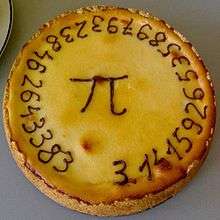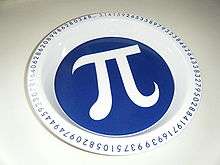π (sometimes written pi) is a mathematical constant whose value is the ratio of any circle's circumference to its diameter in Euclidean space; this is the same value as the ratio of a circle's area to the square of its radius. π is a transcendental number, approximately equal to 3.14159265358979 in the usual decimal notation.
Quotes
- Historically [analytic geometry] arose... from the comparison of curvilinear and rectilinear magnitudes. ...the Egyptians and Babylonians, in their geometry of the circle, took the first steps. The former made a remarkably accurate estimate of the ratio of the area of the circle to the area of the square on the diameter, taking the ratio to be , equivalent to taking a value of about 3.16 for . The Babylonians adopted the cruder approximation 3... (although an instance is known in which the value is taken as ), but... recognized that the angle inscribed in a semicircle is right, anticipating Thales by well over a thousand years. Moreover, they were familiar... with the Pythagorean theorem.
- Carl B. Boyer, History of Analytic Geometry (1956)
- Sweet and gentle and sensitive man
With an obsessive nature and deep fascination
For numbers
And a complete infatuation with the calculation
Of π.
- He does love his numbers
And they run, they run, they run him
In a great big circle
In a circle of infinity
3.14159 26535897932 3846 264 338 3279...
- It's a door, Sol. It's a door.
- Maximillian Cohen, in π (1998), written by Darren Aronofsky, Sean Gullette, and Eric Watson
- Something's going on. It has to do with that number. There's an answer in that number.
- Maximillian Cohen, in π (1998), written by Darren Aronofsky, Sean Gullette, and Eric Watson
- One of the most frequently mentioned equations was Euler's equation, Respondents called it "the most profound mathematical statement ever written"; "uncanny and sublime"; "filled with cosmic beauty"; and "mind-blowing". Another asked: "What could be more mystical than an imaginary number interacting with real numbers to produce nothing?" The equation contains nine basic concepts of mathematics — once and only once — in a single expression. These are: e (the base of natural logarithms); the exponent operation; π; plus (or minus, depending on how you write it); multiplication; imaginary numbers; equals; one; and zero.
- There is a famous formula, perhaps the most compact and famous of all formulas — developed by Euler from a discovery of de Moivre: It appeals equally to the mystic, the scientist, the philosopher, the mathematician.
- Edward Kasner and James R. Newman in Mathematics and the Imagination (1940)
- Among his [John Wallis'] interesting discoveries was the relation
one of the early values of π involving infinite products.- David Eugene Smith, History of Mathematics (1923) Vol.1; Footnote: see his Opera Mathematica, I, 441
External links
- Digits of Pi at DMOZ
π Day
This article is issued from
Wikiquote.
The text is licensed under Creative
Commons - Attribution - Sharealike.
Additional terms may apply for the media files.


